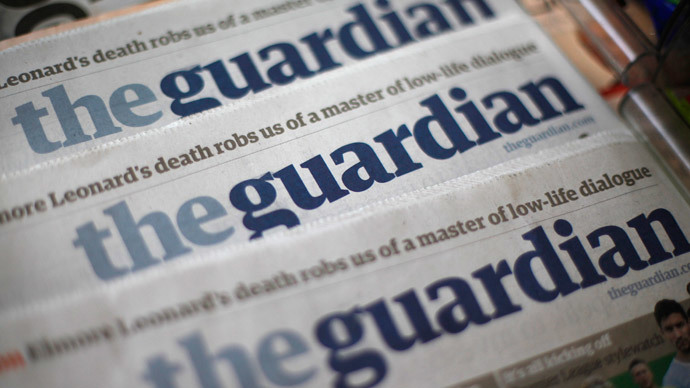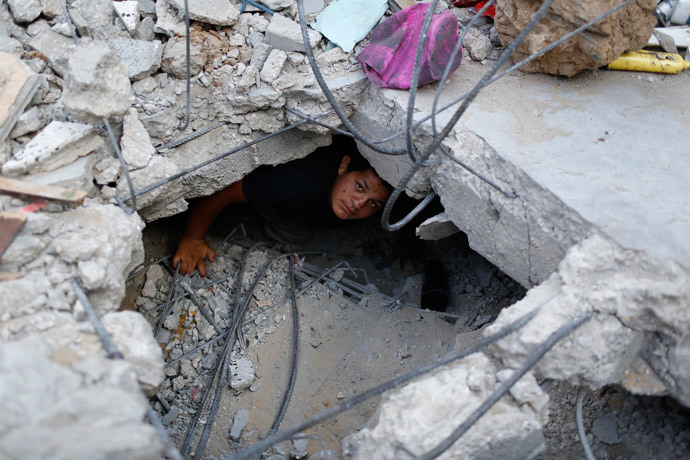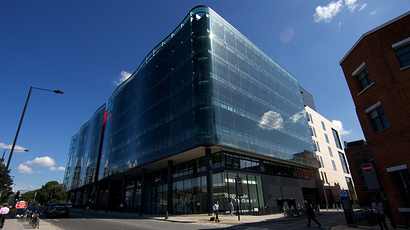Guardian accused of pro-Israel bias over anti-Hamas ‘child sacrifice’ ad

Britain’s Guardian newspaper has been accused of pro-Israel bias after publishing a widely condemned advert paid for by Jewish group This World: The Values Network, which accused Hamas of “child sacrifice”.
The advert previously ran in the New York Times, Wall Street Journal and Washington Post but was rejected by The Times in London. The paper said: “The opinion being expressed is too strong and too forcefully made and will cause concern amongst a significant number of Times readers.”
The ad, headlined: “Jews rejected child sacrifice 3,500 years ago. Now it’s Hamas turn,” was written by Elie Wiesel, a Nobel Peace Laureate and Holocaust survivor. “In my own lifetime,” Wiesel wrote, “I have seen Jewish children thrown into the fire. And now I have seen Muslim children used as human shields, in both cases, by worshippers of death cults indistinguishable from that of the Molochites.”
Text of ad by This World: The Values Network, calling on #Hamas to reject child sacrifice: pic.twitter.com/F4aLD7szOg
— Lilac Sunday (@LilacSundayBlog) August 4, 2014
Wiesel proposed the battles occurring today were not of Jew versus Arab or Israeli versus Palestinian but a battle between “those who celebrate life and those who champion death. It is a battle of civilization versus barbarism.”
He urged that criticism be shifted away from Israeli soldiers and rather directed at “the terrorists who have taken away all choice from the Palestinian children of Gaza.”
“I call upon the Palestinian people to find true Muslims to represent them, Muslims who would never voluntarily put a child in danger,” he added.
Brilliant speech at #Gaza demo by Jewish student: why opposing Israel's atrocities is not anti-Semitic http://t.co/Hy68sDaKE2
— Stop the War (@STWuk) August 11, 2014
After publishing the ad in Monday’s edition, the Guardian reported that it had received 140 complaints from readers and pro-Palestinian activists. The following day it carried a letter jointly signed by leading campaigners.
“We write to condemn the decision to print a wildly inaccurate and inflammatory advert from supporters of the state of Israel branding the Palestinian resistance as ‘child killers’,” wrote campaigners including MPs, journalists, peace advocates and pro-Palestinian Jewish activists. “This is especially sickening when Israel's latest bombardment of Gaza has killed close to 400 Palestinian children.”
“Sadly, the decision to print this advert, rejected by the Times newspaper, is another sign of the increasingly pro-Israeli bias of the Guardian's editorial policy, including the gross underestimate of the size of last Saturday's Gaza protest demonstration.”

The letter called on the Guardian editor to “redress the balance” in future coverage, and rejected claims that the movement is anti-Semitic.
“You are repeatedly running the slur that those who campaign in support of Palestine are anti-Semitic when the very many Jews in the movement, and the movement as a whole, have repeatedly made it absolutely clear that this is not the case.”
A spokesperson for Guardian News & Media defended the decision to run the ad, and defended the paper’s track record of balanced Middle East coverage.
“The decision to run any display advertisement in the Guardian is made on a case-by-case basis and there was a full discussion about accepting the advert in question,” the spokesperson said.
“However, the acceptance of advertising from any organization does not equate to support or endorsement for the views expressed in that advert. The Guardian is fully committed to reporting from the Middle East and our coverage will continue to be independent and robust.”














